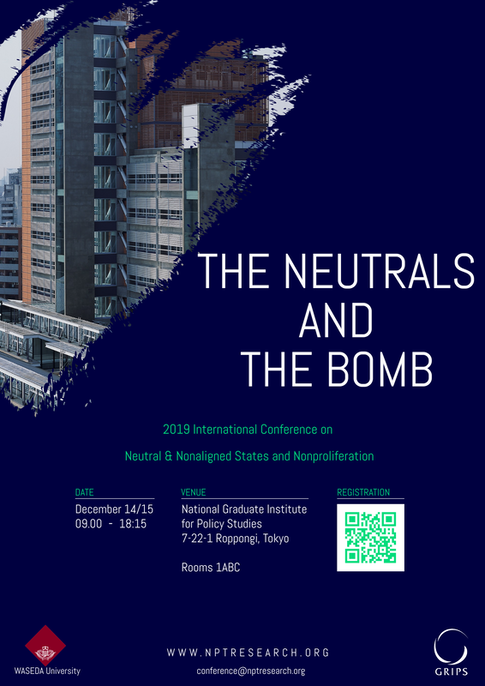The Neutrals and the Bomb:
Neutral & Nonaligned States and Nonproliferation
|
One of the gravest issues facing the international community today remains the problem of how to live with the most destructive weapon mankind has ever invented. With recent advancements in technology, and some of the Cold War arms control agreements crumbling—like the INF treaty—we could be at the threshold of a new nuclear age. It is therefore even more important to understand one of the central agreements of the nuclear order we currently live in. The regulation of nuclear technology through the “Treaty on the Non-Proliferation of Nuclear Weapons” (NPT) was a landmark agreement during the Cold War, which has shown unexpected longevity. With a total of 191 signatory states, and remarkable success in halting the spread of the deadliest weapon systems known to humanity, the NPT was—and still is—one of the most essential features of the global security architecture. Academic research on the origins, the development, and the status of Nuclear and Nonproliferation-related movements has often focused on the roles of the Great Powers on both sides of the iron curtain, whose signatures became the centerpiece for the success of the NPT-regime. |
What has repeatedly been overlooked is the role of other states that were also influenced by nuclear questions but tried to distance themselves from the block mentality. Neutral and Nonaligned countries (“N+N States”) are usually not included in the systematic analysis of Global Nuclear History. Despite, for example, that the UN-initiative for the NPT came from Ireland, that the treaty was mostly negotiated in Switzerland, and that the first signatory was Finland, the N+N states have never received much attention neither for their role in the treaty process nor in the developments after that.
This conference will fill the void. In collaboration with the National Graduate Institute for Policy Studies (Tokyo), Waseda University (Tokyo), and the Institute for Policy Research at the Catholic University of America (Washington DC), we call upon researchers from all disciplines to participate in a two-day venue in Tokyo, Japan. The conference will bring together insights about the Nuclear Histories of the N+N states in general, and their engagement with the NPT in particular, since the 1950s until today.
This conference will fill the void. In collaboration with the National Graduate Institute for Policy Studies (Tokyo), Waseda University (Tokyo), and the Institute for Policy Research at the Catholic University of America (Washington DC), we call upon researchers from all disciplines to participate in a two-day venue in Tokyo, Japan. The conference will bring together insights about the Nuclear Histories of the N+N states in general, and their engagement with the NPT in particular, since the 1950s until today.
Your browser does not support viewing this document. Click here to download the document.
Your browser does not support viewing this document. Click here to download the document.
* The participant names are listed alphabetically.
Organizing Committee
Co-Director: Dr. Pascal Lottaz, Waseda Institute for Advanced Studies, Tokyo
Co-Director: Dr. Yoko Iwama, National Graduate Institute for Policy Studies, Tokyo
Secretary: Oktay Kurtulus, National Graduate Institute for Policy Studies, Tokyo
Associate: Dr. Herbert R. Reginbogin, Fellow at Catholic University of America
Co-Director: Dr. Pascal Lottaz, Waseda Institute for Advanced Studies, Tokyo
Co-Director: Dr. Yoko Iwama, National Graduate Institute for Policy Studies, Tokyo
Secretary: Oktay Kurtulus, National Graduate Institute for Policy Studies, Tokyo
Associate: Dr. Herbert R. Reginbogin, Fellow at Catholic University of America
All inquiries should be directed to: [email protected]
Supported by
National Graduate Institute for Policy Studies (GRIPS), Tokyo
Waseda University, Waseda Institute for Advanced Studies (WIAS), Tokyo
Catholic University of America (CUA), Washington DC — Permanent Neutrality Working Group
National Graduate Institute for Policy Studies (GRIPS), Tokyo
Waseda University, Waseda Institute for Advanced Studies (WIAS), Tokyo
Catholic University of America (CUA), Washington DC — Permanent Neutrality Working Group

